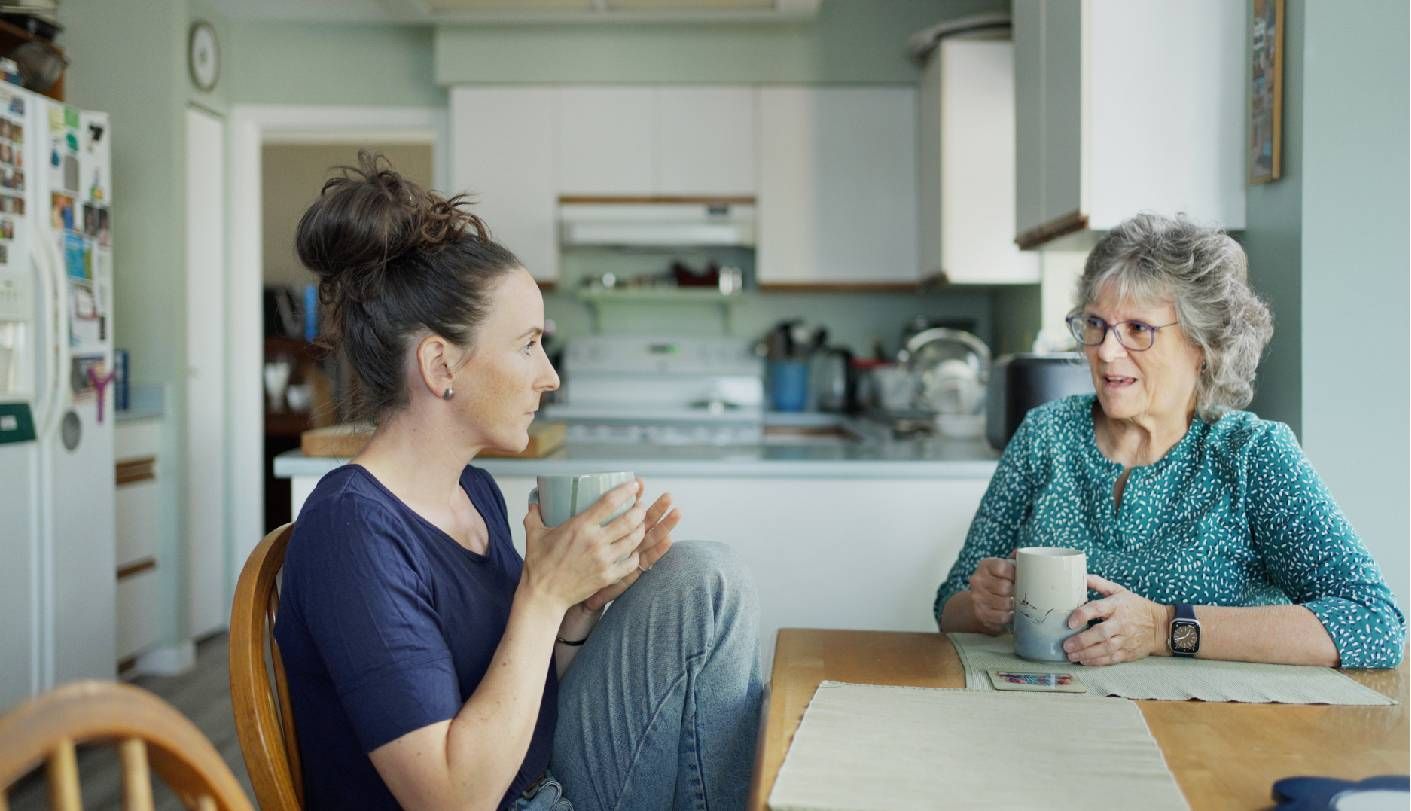Navigating Relationships With Aging Parents When You Aren't Close
The key is to manage expectations and have mutual goals. Do you want the relationship to be back to the way it was or one you always wanted but never had?
While there are no dramatic estrangement narratives nor closet demons in my family, we are not especially close. I used to feel this was a unique and uncommon scenario; that there was something wrong with us. As I researched and talked to others, I found that notion to be categorically untrue – and more common than I realized.

Marta told me about her 88-year-old father who moved in with her last summer because he was getting a divorce; something she never expected or wanted.
"We love each other and get along but are we close? He understands so little about my life because over the decades I've told him little."
"We love each other and get along but are we close? He understands so little about my life because over the decades I've told him little," she said. He doesn't really want to live with her either but they both work on accepting their situation.
"I don't want anything to happen to him, but the idea of living like this for years is daunting to me," Marta said.
Deb takes care of her one remaining parent, who has dementia and gave her power of attorney, a responsibility that she says has taken her life from her. Though she has siblings, being responsible and "the good kid" made her parents assume she would be the one to handle everything at the end of their lives. Now, all her dreams and goals are on the back burner.
"I do love and care for my mother. But I have more years behind me than ahead of me - and I have a feeling I'll be caring for her until I'm 80 years old," Deb said. "I would be lying if I didn't say I hold some resentment because of that."
Judy is the health care proxy for her 80-year-old father who has Alzheimer's. She, too, harbors some resentment but for very different reasons. Her father failed to protect her when she was young, kicking her out of the house when her college grades dropped and expressing judgement about the way she lived her life.
Layers of Complexity
"I don't hate him but being put in the position of parenting him now really sucks. I do it out of guilt," she said. Judy describes her father as a difficult person; not mean but not warm; masking his feelings with sarcasm and bad jokes. She doesn't have kids of her own, in part, she admitted, because she doesn't want to perpetuate the cycle of violence she grew up in.
All of these situations add layers of complexity (and all sorts of emotions) when faced with figuring out how to care for an aging parent, especially when they fall ill. It's difficult to determine the "right" course of action(s).
For me, I always want to know the why of something; why things turned out the way they did, even if a true 'why' proves elusive. If I were to figure out why, perhaps I would know how to remedy it.
Non-Dramatic Reasons Families Grow Apart
Physical distance is the most obvious cause simply because it translates into fewer opportunities for people to connect.
It's not only the children who may not interact but also the parents; an important distinction when it comes to guilt.
Other reasons include generational differences, family divorce or just general discontent and unhealthy feelings in regard to family involvement, said Renee A. Exelbert, psychologist at The Metamorphosis Center for Psychological and Physical Change in New York.
Adults who had difficult childhoods often felt better and emotionally healthier outside of their home, she explained, adding that people focus on individual therapy and figuring out what works best for them. This often means getting rid of relationships that don't meet their needs.
Some people also become invested in being isolated, Patricia Pitta, clinical and couple and family psychologist in Manhasset, New York, told me.
"People become institutionalized to being able to be alone (which many experienced during COVID)," Pitta said. "People grow apart; lives take on tempos of their own."
There could also be a shift in goals or life directions, said Tarra Bates-Duford, psychologist at Family Matters Counseling Group in Raleigh, North Carolina, or sometimes a misunderstanding that was never fully teased out.
Different things become important as you go through the life cycle, Pitta explained. It's not only the children who may not interact but also the parents; an important distinction when it comes to guilt. After all, phones (and trains and planes) go both ways.
Life pulls us in different directions. To combat that (if someone decides they want to), involves making a conscious choice to change that trajectory.
"People have to put out the effort," said Pitta. "They have to make the time." This seems obvious but, as most people know, it's easy to perpetually decide to make that phone call tomorrow.
This seems obvious but, as most people know, it's easy to perpetually decide to make that phone call tomorrow.
Pitta also pointed out most people repeat the structure they grew up with. For example, those who were brought up to be independent, both emotionally and otherwise, likely don't call their parents much when they go off to school. Some parents can't wait until their kids leave so they can travel the world.
When the Void Grows
"As the void gets wider, no one talks about it," said Bates-Duford, "They assume the other person knows what they're thinking and feeling." Going on and on without discussing the lack of contact means eventually it becomes your new normal.
To alter the situation, the most important thing, according to Bates-Duford, is to acknowledge the distance. The worst thing you can do is pretend it doesn't exist.
"Not only is that a denial, but it's a minimization of your feelings and your parents' feelings," she said. She explained it like this: everything that happens or doesn't happen in our lives affects who we are and if we don't acknowledge these things, we're working with older versions of ourselves and our parents.
Guilt and Regret
If considerable time has passed and you're faced with deciding how to deal with your aging and/or ill parents, what do you do with the onslaught of emotions? Especially the guilt.
"It's much easier to say I'm [feeling] guilty about something than I'm angry," said Pitta, "Usually anger is under the guilt; either at the self or the situation."
Exelbert says it's common (and expected) to feel regret, shame, anger, frustration and ultimately anxiety especially over possible rejection when you do reach out.
"There's a lot of ambivalence about whether or not to leave things as is," she said.
Figure out what your expectations are for the relationship, Exelbert told me, and analyze if the expectations are normative. Many people's perceptions of others' relationships are skewed. In other words, don't believe everything you see on an Instagram reel.
"I think as we grow older, the beautiful things shine through more. Hopefully there's forgiveness of the imperfections and more of an understanding that life is really hard."
Also, she added, realize that you're probably not going to get all your needs met as far as this particular relationship goes, and you need to be okay with that. You can't fully change someone just as they cannot fully change you.
If You Want to Reconnect, Here's How
Consider small gestures like a post card, a letter or short phone call. Ask questions about your childhood or family history if you're comfortable going that route, suggested Exelbert. Allow space in your heart for some forgiveness if you're able.
"I think as we grow older, the beautiful things shine through more. Hopefully there's forgiveness of the imperfections and more of an understanding that life is really hard," said Exelbert.
And again, manage expectations. Are you hoping for a full-blown relationship? Forgiveness? A relationship to be back to the way it was or one you always wanted but never had? Is there a mutual goal?
That mutual goal thing is key.
Pitta says she gets many calls from parents, (especially when an illness happens) who want to have sessions with their adult children to reconnect, redefine and renavigate their next stage of life. She likened this to the need for people to have a financial planner.
"They seek out an emotional planner," she said. In her sessions, she guides them to talk about roles; how they saw each other and interacted and the issues and difficulties.
"Everybody has their own pain history in a relationship."
'Pain Often Looks Like Anger'
Pain often looks like anger, said Bates-Duford.
"And we don't necessarily have to understand a feeling to respect it. But we do need to talk about it if we want to change things, even small things. As long as you hold onto guilt, for instance, there's no room for anything else. The more we carry, the more difficult it is to grab happiness or success," she said.
She continued, "I don't think there's truly any way to 'make up' for mistakes of the past (yours or your parents) but I do think there's a way toward something new if (and this is a big if), that is something that's important to you. Talking can be hard. Change is always hard."
According to Exelbert, "At least when you try, there's possibility."
In "An American Prayer," Jim Morrison, the lead singer of The Doors, who my mom loves, wrote: "Did you have a good world when you died? Enough to base a movie on?"
I think about this a lot. Not the movie part but the good world part. And I think that is all anyone of us can wish for — for ourselves and our parents — and whatever it may mean for each of us.


